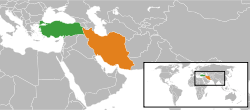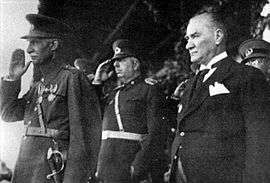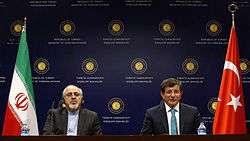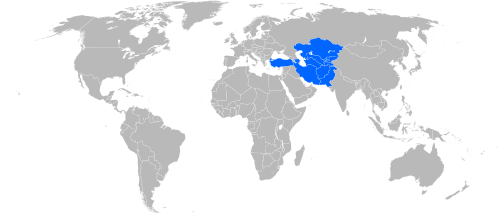Iran–Turkey relations
 |
|
Turkey |
Iran |
|---|---|
The relations between the Islamic Republic of Iran and the Republic of Turkey have been generally peaceful since the establishment of the modern states, but sometimes have also been strained. Iran and Turkey are major trade partners. Turkey and Iran have heavy mutual influence on each other, due to geographical proximity, linguistic and ethnic relations (f.e Azerbaijanis, a Turkic people, are the second largest ethnicity in Iran) many common cultural aspects, shared empires, and conquerings by such as the Parthians, Achaemenids, Sassanians, Seljuks, Safavids, Afsharids, Ottomans and Qajars. Turkey has an embassy in Tehran, and consulates in Tabriz and Urmia. Iran has its embassy in Ankara, and consulates in Istanbul, Erzurum, and Trabzon.
History

Numerous times throughout the millennia long history the two neighbouring nations share, (parts) of the soil of modern-day Turkey was conquered by the various in modern-day Iran based empires, such as by the Median Empire, Achaemenid Empire, the Parthian Empire, the Sassanian Empire, the Safavid Empire, and the Afsharid Empire, amongst others. In ancient times, what is nowadays Turkey formed one of the core regions of the Achaemenid Empire, with most notably the cities of Sardis and Smyrna in western Anatolia. Igdir Province in what is Eastern Anatolia formed in fact part of Qajar Iran up to the outcome of the Russo-Persian War (1826-1828) and the ratified Treaty of Turkmenchay.
Various empires based in what is now Turkey made inroads into what is now Iran, such as by the Byzantine Empire, and the Ottoman Empire.
Iran's second major ethnic group is Azerbaijani which is a Turkic people. Turks and Iranians share a common cultural heritage, known as the Turko-Persian tradition, which was a prominent characteristic of the Ghaznavid (977–1186), Seljuk (1037–1194), Sultanate of Rum (1077–1307), Ottoman (1299–1923), Timurid (1370–1507), Kara Koyunlu (1374–1468), Ak Koyunlu (1378–1501), and Safavid (1501–1736) Empires.
20th century
On 22 April 1926 the First "Treaty of Friendship" between Iran and Turkey was signed in Tehran. The basic principles included friendship, neutrality and nonaggression towards each other. The agreement also included possible joint actions to groups in the territories of both countries which would try to disturb peace and security or who would try to change the government of one of the countries. This policy was indirectly aimed at the internal problems both countries had with their Kurdish minorities.
On 23 January 1932 the first definitive frontier treaty between Turkey and Iran was signed in Tehran. It should be mentioned that the border between Turkey and Iran is one of the oldest in the world and has stayed more or less the same since the Battle of Chaldiran in 1514, and the Treaty of Zuhab. In other words, this 1932 treaty was basically the rubber-stamping of the centuries-old status quo. On the same day the countries signed a new Treaty of Friendship, as well as a Treaty of Conciliation, Judicial Settlement and Arbitration.

Between 16 June and 2 July 1934, Reza Shah Pahlavi visited Turkey, together with a mission of high-ranking officials, among which General Hassan Arfa, at the invitation of Mustafa Kemal Atatürk. Several regions in Turkey were visited and attempts at close friendship and cooperation between the two leaders were made. Reza Shah Pahlavi was reportedly impressed by the republic's modernization reforms and he saw this as an example for his own country.
On 8 July 1937 a Treaty of Non-aggression was signed between Turkey, Iran, Iraq and Afghanistan. This treaty would become known as the Treaty of Saadabad. The purpose of this agreement was to ensure security and peace in the Middle East.
In August 1955 CENTO (Central Treaty Organization), a mutual security-pact between Iran, Turkey, Iraq, Pakistan and Britain was established.
In July 1964 the RCD (Regional Cooperation for Development), aimed at joint economic projects between Iran, Turkey and Pakistan was established.
A period of coldness passed after the 1979 Iranian Revolution which caused major changes in Iran and the Middle Eastern status quo. Today Iran and Turkey closely cooperate in a wide variety of fields that range from fighting terrorism, drug trafficking, and promoting stability in Iraq and Central Asia.
Iranian Nuclear Program
In May 2010, Turkish Prime Minister Recep Tayyip Erdogan made an unscheduled trip to Tehran in coordination with Brazilian President Lula da Silva to make an agreement to outsource Iranian uranium enrichment to his country to avoid further sanctions on Iran.[1] In supporting Iran after the agreement Erdogan turned the question back on the international community. "In fact, there is no nuclear weapon in Iran now, but Israel, which is also located in our region, possesses nuclear arms. Turkey is the same distance from both of them. What has the international community said against Israel so far? Is this the superiority of law or the law of superiors?"[2] This comes after growing pressure from the U.S.A. and the U.K. to support sanctions against Iran.[3]
The decision of Turkey to host a radar system to track missiles launched from Iran has been seen by the Iranians as a serious break in relations.[4]
In a 2012 Pew Research Global Attitudes Survey, 54% of Turks oppose Iran's acquisition of nuclear weapons, 46% consider a nuclear-armed Iran somewhat a "threat" and 26% support the use of military force to prevent Iran from developing nuclear weapons.[5] 37% of Turks believe that Iran is not a threat at all, the highest percentage between surveyed countries.[5] Only 34% of Turkey's population approves of "tougher sanctions" on Iran, compared to 52% of Turks disapproving of sanctions.[5]
NATO missile shield crisis

Turkey, the largest NATO member in the region, hosted the establishment of a NATO missile shield in September 2011. The establishment of NATO defense shield has caused a crisis between Turkey and Iran. Iran claimed that the NATO missile shield is a US ploy to protect Israel from any counter-attack should Israel target Iran's nuclear facilities. In addition, Iranian Ayatollah Ali Khamenei stated that Turkey should rethink its policies over Syria, the NATO defense shield, and promotion of secularism over the Arab world following the Arab Spring.[6]
Iranian Major General Yahya Rahim Safavi also expressed his opinion over the situation. "The behaviour of Turkish statesmen towards Syria and Iran is wrong and, I believe, they are acting in line with the goals of America," he told to MNA. "If Turkey does not distance itself from this unconventional political behaviour it will have both the Turkish people turning away from it domestically and the neighbouring countries of Syria, Iraq and Iran reassessing their political ties." he also added.[6]
Turkey stated that the NATO system neither cause threat to a nation nor target any particular nation.[7][8] Turkish Minister of National Defense, İsmet Yılmaz, insisted that NATO missile defense system's aim is to secure Europe, adding that it's also for security of Turkey.[9]
On October 23, 2011, the US Secretary of State Hillary Clinton warned Iran over United States' presence in Turkey. “Iran would be badly miscalculating if they did not look at the entire region and all of our presence in many countries, both in bases and in training with NATO allies, like Turkey,” Clinton said.[10]
In November 2011, the head of the Iranian Guard's aerospace division threatened to strike Turkey if other countries attacked Iran.[11]
Relations of Turkey and Iran with Israel
In the past, Turkey's ties with Israel have caused various disagreements between Ankara and Tehran. However, Turkey's neutral stance with regards to the disputes between Israel and Iran has secured the maintenance of friendly bilateral relations. The growing trade between Turkey and Iran indicate the two countries’ willingness to strengthen mutual ties.
Turkey's relations with Israel have deteriorated after the Gaza War (2008–09), the Gaza flotilla raid (2010) and the 2014 Israel–Gaza conflict. Since 2010, Turkey has no diplomatic relations with Israel in the ambassadorial level.
Since the Arab Spring
Iran's relations with Turkey have occasionally soured over the AKP government's active involvement in regional disputes between Shia and Sunni groups since the dawn of the Arab Spring.[12] Iran firmly backs the Syrian government of Bashar al-Assad (formed mostly of Alawite Shia Muslims), while the AKP government in Turkey (which has its roots in political Islam) supports the Syrian opposition (formed mostly of Sunni Muslims).
During the 2015 military intervention in Yemen, Iran and Turkey supported rival (Shia and Sunni, respectively) groups, which led to official arguments between Recep Tayyip Erdoğan and Mohammad Javad Zarif. Erdoğan stated that "Iran and the terrorist groups must withdraw" and Zarif replied "Turkey makes strategic mistakes". However, a few days later, Erdoğan went to Tehran for talks on improving Turkish-Iranian trade relations and was received by Khamenei and Rouhani.[13]
Before the ascent of the Islamist AKP government to power in 2002, Turkey (a constitutionally secular state) had maintained a neutral foreign policy with regards to the religious and sectarian conflicts in the region.
Collaboration against terrorism
Turkey and Iran vowed to collaborate in their fight against terrorists in Iraq, as thousands of Turkish troops pressed ahead with an air and ground offensive against the militants in northern Iraq. Iranian Foreign Minister Ali Akbar Salehi claimed that the deaths of Turkish soldiers might have been avoided if the United States had informed Turkey that the terrorists were infiltrating into Turkey with heavy weaponry. The U.S. shares intelligence from surveillance drones with Turkey about movement of the PKK along the border.
The Turkish government shut down a probe that revealed connections between the Iranian Revolutionary Guard and the highest levels of the Turkish government.[14]
Trade relations

Iran and Turkey also have very close trade and economic relations. Both countries are part of the Economic Cooperation Organization (ECO). Turkey receives many Iranian tourists each year and economically benefits from Iranian tourism.[15]
Bilateral trade between the nations is increasing. In 2005, the trade increased to $4 billion from $1 billion in 2000.[16] Iran’s gas export to Turkey is likely to be increased. At present, the rate is at 50mm cm/d.[17] Turkey imports about 10 billion cubic meters a year of gas from Iran, about 30 percent of its needs.[18] Turkey plans to invest $12 billion in developing phases 22, 23 and 24 of South Pars gas field, a senior Iranian oil official told Shana.ir.[17] Two-way trade is now in the range of $10 billion (2010), and both governments have announced that the figure should reach the $20 billion mark in the not too distant future.[19][20] 50 percent of the gas from three phases of Iran’s South Pars gas field will be re-exported to Europe.[21] Turkey has won the tender for privatization of Razi Petrochemical Complex valued at $650 million (2008). On tourism, every year one million Iranians visit Turkey.[22]
Iranian First Vice President Mohammad-Reza Rahimi announced in October 2012 that the speed of trade exchanges between Iran and Turkey has accelerated and was close of reaching the goal of 30 billion dollars per year. He added that the growing trade relations between Tehran and Ankara indicate the two countries’ willingness to strengthen mutual ties.
Tourism
Iran and Turkey have extensive tourism relations for years. As of 2013, tourists from Turkey comprise one of the largest that visit Iran, comprising 391,283 registered tourists.[23]
See also
- Turko-Persian tradition
- Seljuk Empire
- Ottoman-Persian Wars
- Ottoman Empire–Safavid Empire relations
- Central Treaty Organization
- Economic Cooperation Organization
- Foreign relations of Iran
- Foreign relations of Turkey
References
- ↑ News Al Jazeera 17 May 2010
- ↑ News PressTV
- ↑ "Coming war against Iran: Increasing Anglo-American pressure on Turkey". Global Research. 21 June 2008.
- ↑ Jones, Dorian. "Turkey And Iran: The End Of The Affair." Radio Free Europe 19 October 2011.
- 1 2 3 A Global “No” To a Nuclear-Armed Iran Pew Research Center
- 1 2 Iran tells Turkey to change tack or face trouble Hurriyet, 9 October 2011
- ↑
- ↑ "Turkey to site Nato missile shield radar in its south-east". The Guardian (London). 14 September 2011.
- ↑ Turkish defense minister: NATO missile defense system's aim is to secure Europe Cumhuriyet
- ↑ Clinton warns Iran over US presence in Turkey Hurriyet Daily News 24 October 2011
- ↑ "Iran to hit Turkey if nuclear program targeted by Israel, U.S., general says." The Associated Press, 26 November 2011.
- ↑ LaFranchi, Howard. "Why Iran got huffy about a certain locale for next nuclear talks." The Christian Science Monitor. 6 April 2012.
- ↑ Erdoğan focuses on trade during Iran visit Al-Monitor
- ↑ "Gov't-led probe covers up Iranians in terror investigation". www.todayszaman.com (TODAY'S ZAMAN). 22 September 2014. Retrieved 24 September 2014.
- ↑ "Turkey, Iran ready to bolster tourism" (– Scholar search). Turkish daily news. June 19, 2006.
- ↑ Schleifer, Yigal (February 2, 2006). "Caught in the fray: Turkey enters debate on Iran's nuclear program". CS Monitor.
- 1 2 http://www.iran-daily.com/1387/3273/html/economy.htm
- ↑ http://www.iran-daily.com/1387/3304/html/economy.htm
- ↑ National Iran Daily
- ↑ http://www.turquoisepartners.com/iraninvestment/IIM-Mar11.pdf
- ↑ Economy Iran Daily
- ↑ Economy Iran Daily
- ↑ "Nearly One Million Azerbaijani Tourists visit Iran annually" - Retrieved 19 November 2015
External links
| Wikimedia Commons has media related to Iran - Turkey relations. |
- "Will Turkey be complicit in another war against another neighbour?". CASMII. 24 February 2008.
- Iran-Turkey relations-Part I Part II Part III (Free PressTV documentary)
| ||||||||||||||||||||||||||||||||||||||||||
| ||||||||||||||||||||||||||||||||||||

